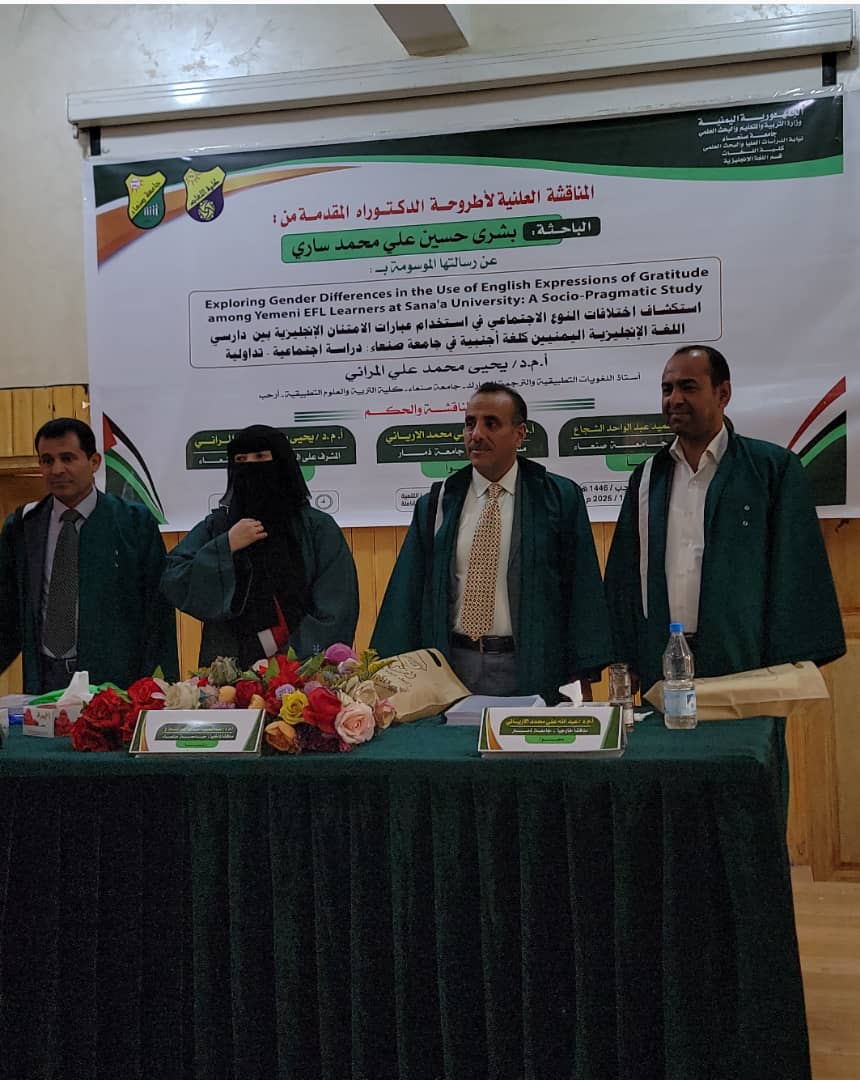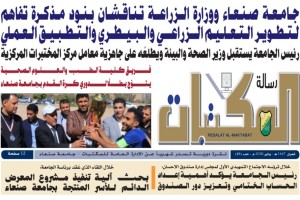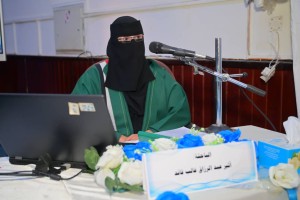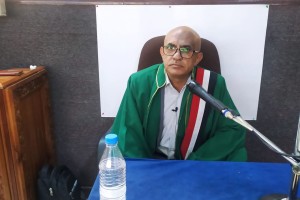Public PhD Viva-Voce Examination of Ms. Bushra Hussein Ali Mohammed Sari
- Categories Letters and Promotions - Graduate Studies, news, Regulations - Postgraduate Studies
- Date January 26, 2025

The Public Viva-Voce Examination for the PhD Dissertation hereto entitled, Exploring Gender Differences in the Use of English Expressions of Gratitude among Yemeni EFL Learners at Sana’a University: A Socio-Pragmatic Study, submitted by Ms. Bushra Hussein Ali Mohammed Sari, Department of English , Faculty of Languages , was held on Thursday, 23/7/1446 Hijri corresponding to 23/1//2025. The Viva-Voce Committee, which was formed based on a resolution issued by the Post-Graduate Studies and Scientific Research Council, consisted of the following:
Committee Members Designation University Position
1 Assoc. Prof. Abdulhameed Abduwahed Ashuja’a Internal examiner Sana’a University Chair
2 Assoc. Prof. Abdullah Ali Mohammed Al-Eryani External Examiner Thamar University Member
3 Assoc. Prof. Yahya Mohammed Ali Al-Marrani Main supervisor Sana’a University Member
The study aimed to
1- To explore the types of English expressions of gratitude that are used by male and female Yemeni EFL learners from Level Four students at the Departments of English at Sana’a University.
2- To identify the most frequently used English expressions of gratitude by male and female Yemeni EFL learners from Level Four students at the Departments of English at Sana’a University.
3- To find out if there are statistical significant differences in the use of English expressions of gratitude between male and female Yemeni EFL learners.
4- To find out how the social distance and social power affect the choice of English expressions of gratitude by male or female Yemeni EFL learners.
The study concluded with a number of findings, including
1- The participants employed the same types of English expressions of gratitude in the twelve gratitude situations with differences in their frequencies and percentages.
2- It is noticed that “bald thanking or using the word “thanks” is the most frequently used strategy by male and female Yemeni EFL learners. “positive feelings” is the second most frequently employed strategy and “repayment” is the third most frequently used strategy that are preferred by the male participants in M-M and M-F interactions and the female participants in F-F, except in F-M interactions, the third most frequently used strategy is “recognition of imposition”.
3- The results also indicated that there are similarities and few differences in terms of the frequencies, percentages and the type of strategies used by the participants in all situations.
4- In addition, this study revealed that there are no statistical significant differences between male and female Yemeni EFL learners in the use of English expressions of gratitude. On the other hand, there are partial statistical significant differences between the male participants in M-M and M-F interactions in situations two, five, six and eleven and between the female participants in F-F and F-M interactions in situations two, six, seven and twelve.
5- This means that gender influences partially on the use of English expressions of gratitude.
6- The results of this study confirmed that the social factors (social distance and social power) play an important role in the choice of English expression of gratitude.
7- Additionally, the results indicated that the participants produced new other strategies of English gratitude that are not exist in Cheng’s (2005) taxonomy.
The researcher made several recommendations, including
1- It is recommended that English syllabuses designers and teachers should be aware and make the students also aware to the issues of pragmatic and cultural differences between two languages (Arabic and English). Therefore, English expressions of gratitude in the given situations might not be used appropriately because of the cultural dimension.
2- In other words, students should be aware of cultural similarities and differences in using English expressions of gratitude in the Yemeni culture and other cultures that differ from one society to another. Besides, they should also be aware of what is acceptable and unacceptable in the culture that they are learned to avoid communication breakdown and also in order to make successful and effective communication.
3- Students should become knowledgeable, not only in the rules of grammar, but also in linguistic rules of the foreign language to avoid the use of the rules of their mother tongue and to express their intention in the other culture easily. In addition, this knowledge enables them to communicate successfully with the native speakers of the English language.
The PhD dissertation has been examined and is recommended by the Viva-Voce Committee for acceptance and approval. The Candidate was recommended to be awarded the degree of PhD majoring applied linguistics.
The viva was attended by academics, researchers, students, and other interested individuals, including the researcher’s colleagues and family members.
Discover more from Sana'a University
Subscribe to get the latest posts sent to your email.
Next post






